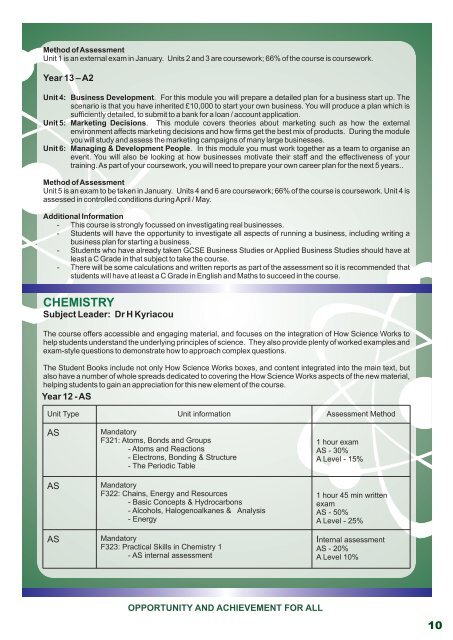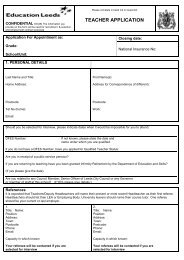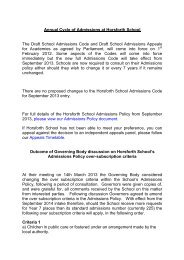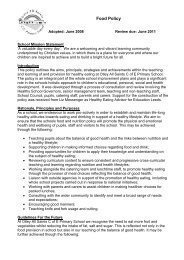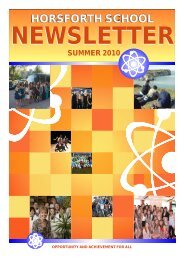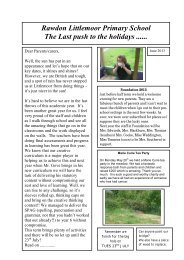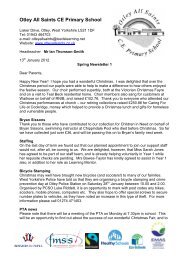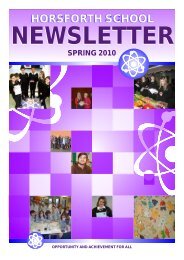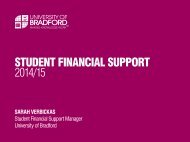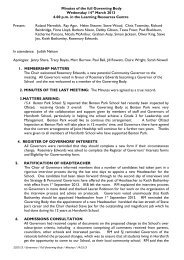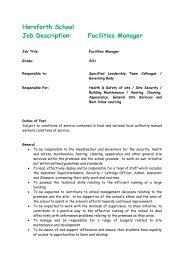POST-16 PROSPECTUS UPDATE SEP 11.cdr
POST-16 PROSPECTUS UPDATE SEP 11.cdr
POST-16 PROSPECTUS UPDATE SEP 11.cdr
You also want an ePaper? Increase the reach of your titles
YUMPU automatically turns print PDFs into web optimized ePapers that Google loves.
Method of Assessment<br />
Unit 1 is an external exam in January. Units 2 and 3 are coursework; 66% of the course is coursework.<br />
Year 13 – A2<br />
Unit 4: Business Development. For this module you will prepare a detailed plan for a business start up. The<br />
scenario is that you have inherited £10,000 to start your own business. You will produce a plan which is<br />
sufficiently detailed, to submit to a bank for a loan / account application.<br />
Unit 5: Marketing Decisions. This module covers theories about marketing such as how the external<br />
environment affects marketing decisions and how firms get the best mix of products. During the module<br />
you will study and assess the marketing campaigns of many large businesses.<br />
Unit 6: Managing & Development People. In this module you must work together as a team to organise an<br />
event. You will also be looking at how businesses motivate their staff and the effectiveness of your<br />
training. As part of your coursework, you will need to prepare your own career plan for the next 5 years..<br />
Method of Assessment<br />
Unit 5 is an exam to be taken in January. Units 4 and 6 are coursework; 66% of the course is coursework. Unit 4 is<br />
assessed in controlled conditions during April / May.<br />
Additional Information<br />
- This course is strongly focussed on investigating real businesses.<br />
- Students will have the opportunity to investigate all aspects of running a business, including writing a<br />
business plan for starting a business.<br />
- Students who have already taken GCSE Business Studies or Applied Business Studies should have at<br />
least a C Grade in that subject to take the course.<br />
- There will be some calculations and written reports as part of the assessment so it is recommended that<br />
students will have at least a C Grade in English and Maths to succeed in the course.<br />
CHEMISTRY<br />
Subject Leader: Dr H Kyriacou<br />
The course offers accessible and engaging material, and focuses on the integration of How Science Works to<br />
help students understand the underlying principles of science. They also provide plenty of worked examples and<br />
exam-style questions to demonstrate how to approach complex questions.<br />
The Student Books include not only How Science Works boxes, and content integrated into the main text, but<br />
also have a number of whole spreads dedicated to covering the How Science Works aspects of the new material,<br />
helping students to gain an appreciation for this new element of the course.<br />
Year 12 - AS<br />
Unit Type Unit information Assessment Method<br />
AS<br />
AS<br />
AS<br />
Mandatory<br />
F321: Atoms, Bonds and Groups<br />
- Atoms and Reactions<br />
- Electrons, Bonding & Structure<br />
- The Periodic Table<br />
Mandatory<br />
F322: Chains, Energy and Resources<br />
- Basic Concepts & Hydrocarbons<br />
- Alcohols, Halogenoalkanes & Analysis<br />
- Energy<br />
Mandatory<br />
F323: Practical Skills in Chemistry 1<br />
- AS internal assessment<br />
1 hour exam<br />
AS - 30%<br />
A Level - 15%<br />
1 hour 45 min written<br />
exam<br />
AS - 50%<br />
A Level - 25%<br />
Internal assessment<br />
AS - 20%<br />
A Level 10%<br />
OPPORTUNITY AND ACHIEVEMENT FOR ALL<br />
10


